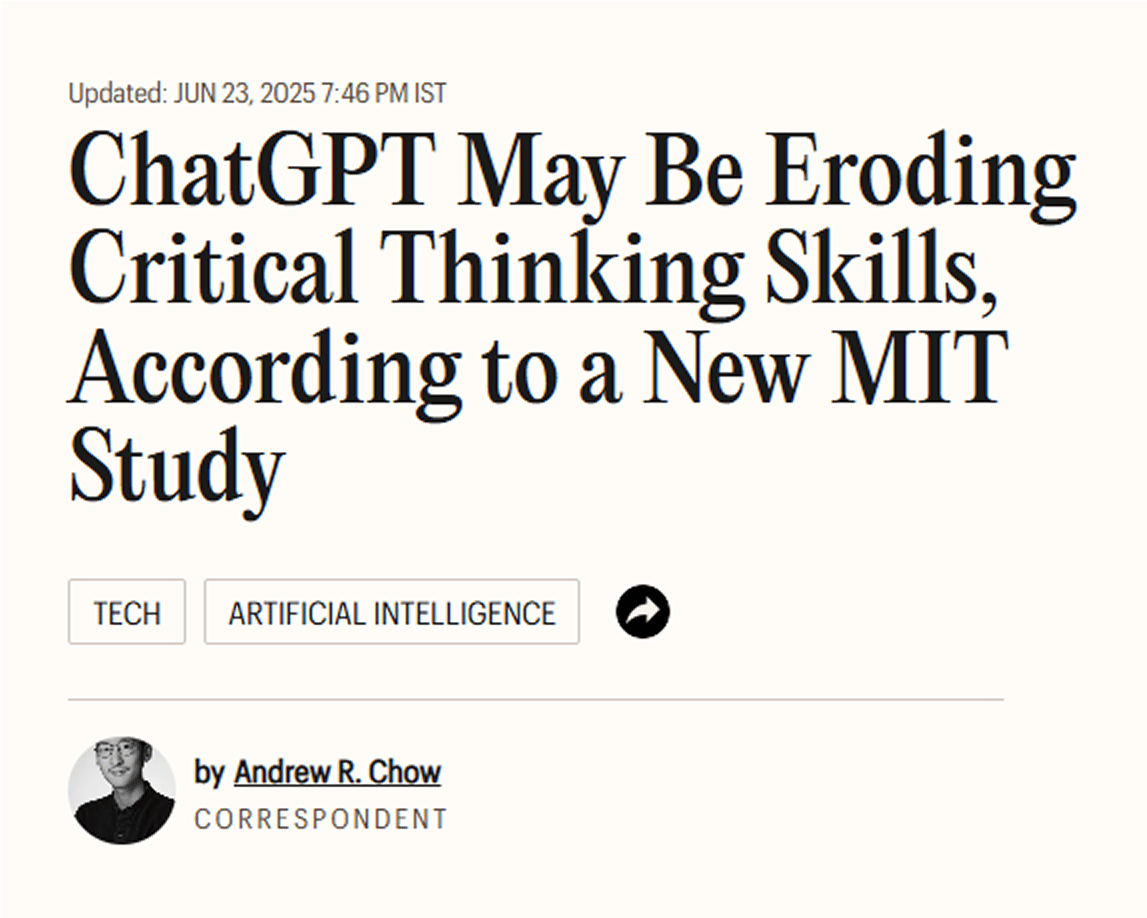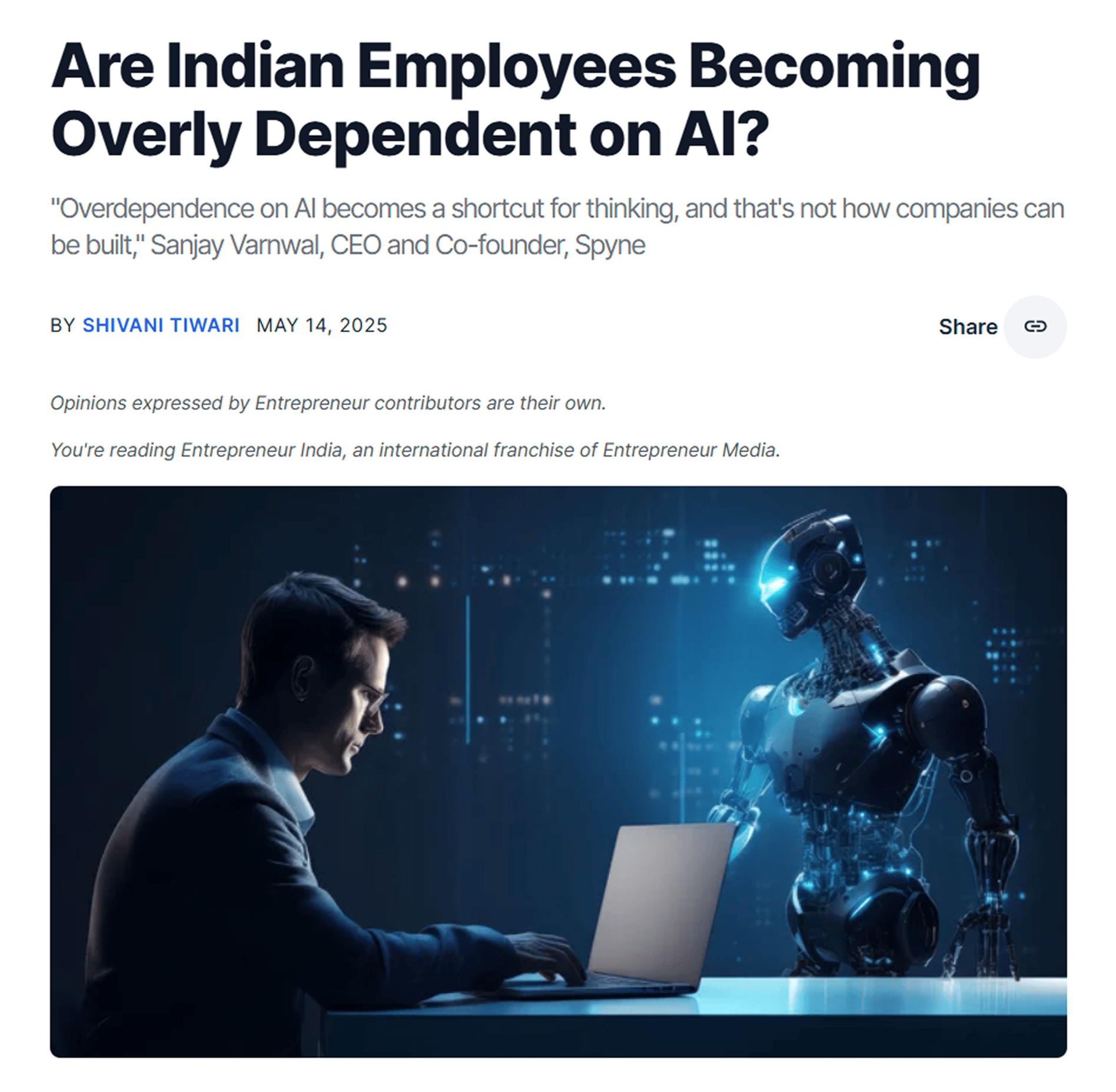- Ritesh Malik
- Posts
- Is your intelligence artificial?
Is your intelligence artificial?
The moment I realized we're raising a generation of brilliant idiots.

Last week, I was interviewing candidates for a strategy role at our portfolio company.
Bright kids from tier 1 colleges in India. Impressive resumes.
I asked a simple question: "Walk me through how you'd analyze market entry for Southeast Asia."
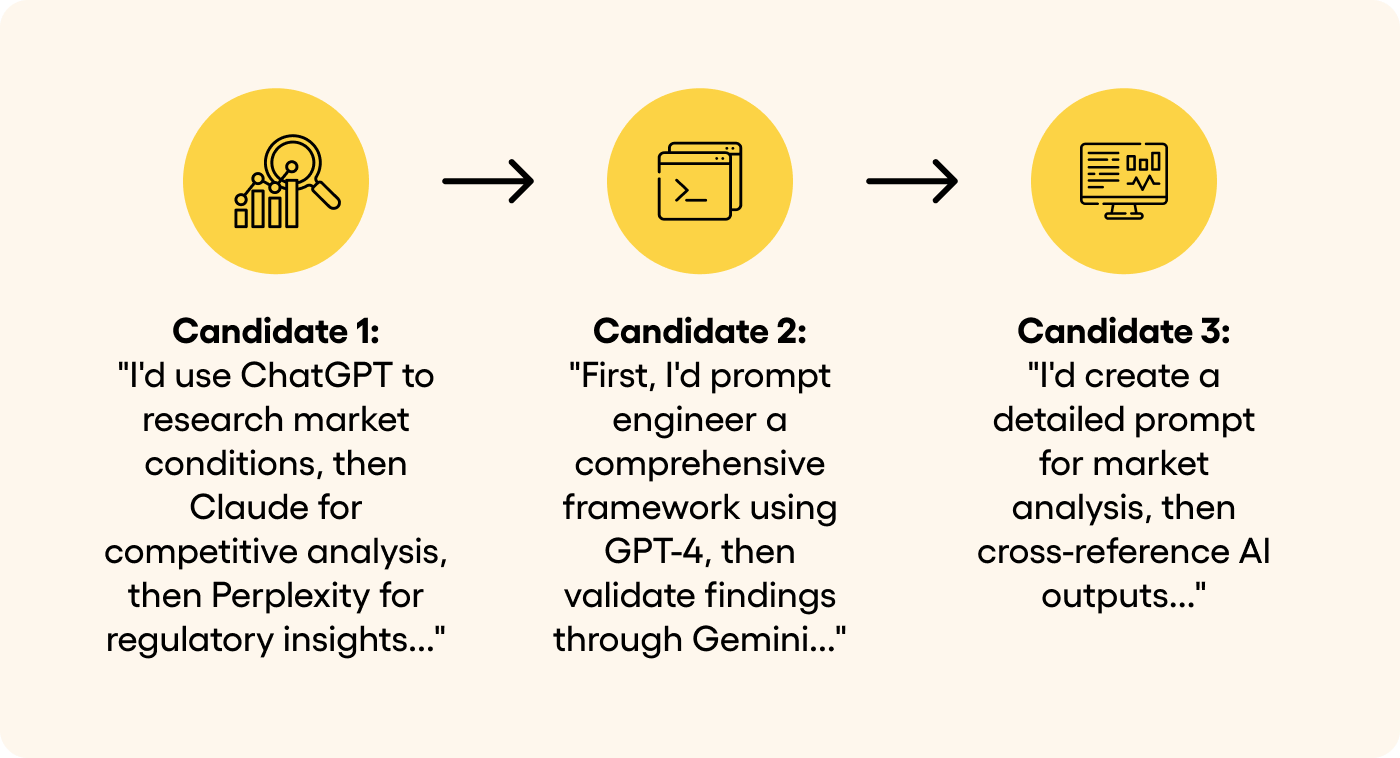
Notice the pattern?
Not one mentioned talking to customers, visiting markets, or building hypotheses from first principles.
And yes, to their defense, everyone is looking for folks who say this.
The issue is, until they understand the context, how will they prompt effectively??
When I asked them to analyze our company's business model without any AI tools, the silence was deafening.
These weren't lazy students.
They were victims of what I'm calling The AI Crutch Crisis: a generation that's accidentally training themselves to be brilliant at asking questions but terrible at thinking.
And no, it’s a problem larger than the students I interviewed…
MIT's latest research is a nice hard punch in the gut for anyone betting on AI-powered productivity.
They tracked 54 people for four months using brain scans.
Instead of a spoiler, here’s the results:
ChatGPT users: Neural connections dropped from 79 to 42
Non-users: Maintained full cognitive connectivity
It gets worse: 83% of AI users couldn't quote their own work minutes after creating it. They'd literally forgotten what they'd just "written."
Another study of 666 professionals found a 68% negative correlation between frequent AI usage and critical thinking abilities.
Translation: The more you use AI, the worse you get at actual thinking.
The University of Toronto documented a 42% decrease in divergent thinking scores among students compared to five years ago.
We're literally making ourselves less creative.
And you’re probably like, Ritesh, we Indians are different…
NOPE.

Here's what shocked me most: India is overdosing on AI.
Microsoft found that 92% of Indian knowledge workers use AI in the workplace: the highest rate globally.
For a minute. You thought you were ahead of the rest..
Being the only one learning and using AI.
But now you know the numbers are vastly different.
It gets crazier:
71% use AI instead of learning underlying skills
73% have made mistakes due to AI usage
72% admitted to misusing AI tools
We've become the world's fastest AI adopters and potentially its biggest casualties.
The ₹1.2 trillion IndiaAI Mission sounds brilliant until you realize we're building our competitive advantage on a foundation that might be eroding human capability.
Real talk: While we're celebrating being AI leaders, are we accidentally creating a generation of cognitively dependent workers?

I started noticing this with my team. Brilliant people who used to come to me with creative solutions now come with AI-generated options.
We're going from "I believe" to "The algorithm suggests." The shift is subtle but profound. From confidence in our own judgment to comfort in artificial validation.
My nephew, a final-year engineering student, told me recently: "Uncle, I can't write without AI anymore.
Not just coding - I mean actual thinking. When I try to solve problems myself, my brain feels... slow."
He's 22 years old. His brain should be at peak creativity and problem-solving capacity. Instead, he's developed what psychologists call "learned helplessness" but for cognition.
This isn't about technology adoption. It's about what happens to human confidence, creativity, and independent thinking when we outsource our mental processes to machines.
The over-reliance on external cognitive tools is changing our concept of self.
We are seeing ourselves as less capable, less creative, less intelligent than we actually are.
It reminds me of a Black Mirror episode called Common People where a sick woman is given a brain implant to keep her alive where she pays for monthly access to the cognitive abilities managed by the implant. (like a subscription)

And today we're paying monthly fees (ChatGPT Plus, Claude Pro, Gemini Advanced) for access to thinking capabilities we used to develop ourselves.
The real cost isn't efficiency. It's the slow erosion of trust in our own minds.
The paradox: AI makes us faster but not smarter. More efficient but less effective. More informed but less wise.

And the generation that created that abbreviation is unfortunately hit the hardest
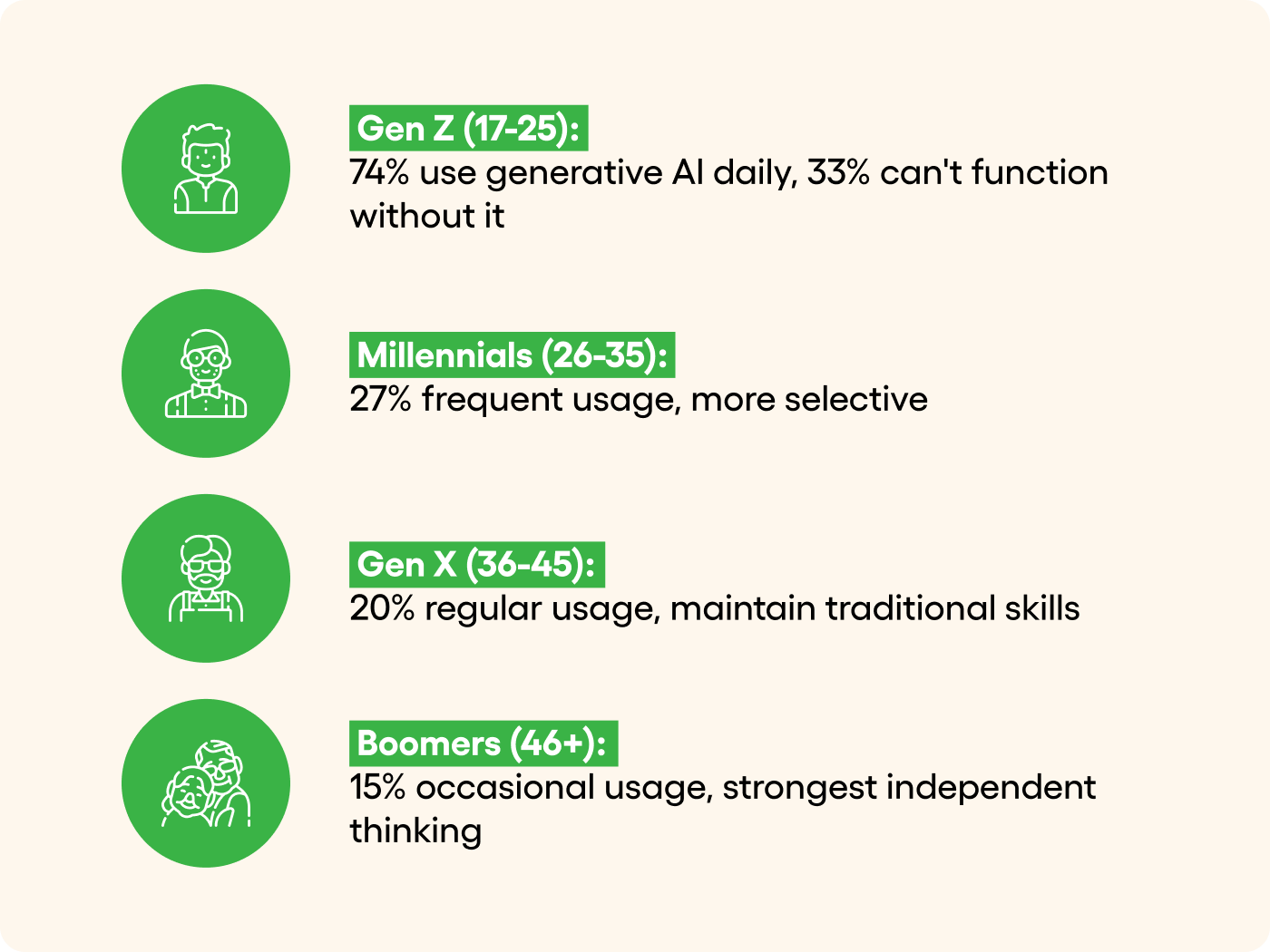
Research shows that while AI boosts writing confidence, 75% of students report reduced critical thinking skills when dependent on AI.
We're creating a generation that can prompt but can't think.
They can generate but can't create.
They can access but can't analyze.
The scary part?
These are tomorrow's CEOs, CTOs, and founders

Strategic decision research from leading business schools shows AI excels at optimization and pattern-matching. But…when it comes to the hardest problems - the ones that create real value - require what I call "beautiful inefficiency."
The messy, non-linear, intuitive leaps that happen when human minds wrestle with ambiguity.
AI consistently fails.
Because those problems need breakthrough strategies, cultural navigation, and relationship-building. They need the inefficient, brilliant complexity of human cognition that no algorithm can replicate.
Intelligence isn't just pattern recognition. It's pattern creation.
Warren Buffett still reads annual reports by hand. Steve Jobs famously avoided focus groups and market research.
They understand something we're forgetting: your unique intelligence is your only sustainable competitive advantage.
Turns out, when you optimize for efficiency, you kill the beautiful human inefficiency that drives breakthrough thinking.
AI makes us faster but not smarter. More efficient but less effective. More informed but less wise.
We're not just losing IQ. We're losing EQ, CQ (cultural quotient), and what I call RQ (relationship quotient).
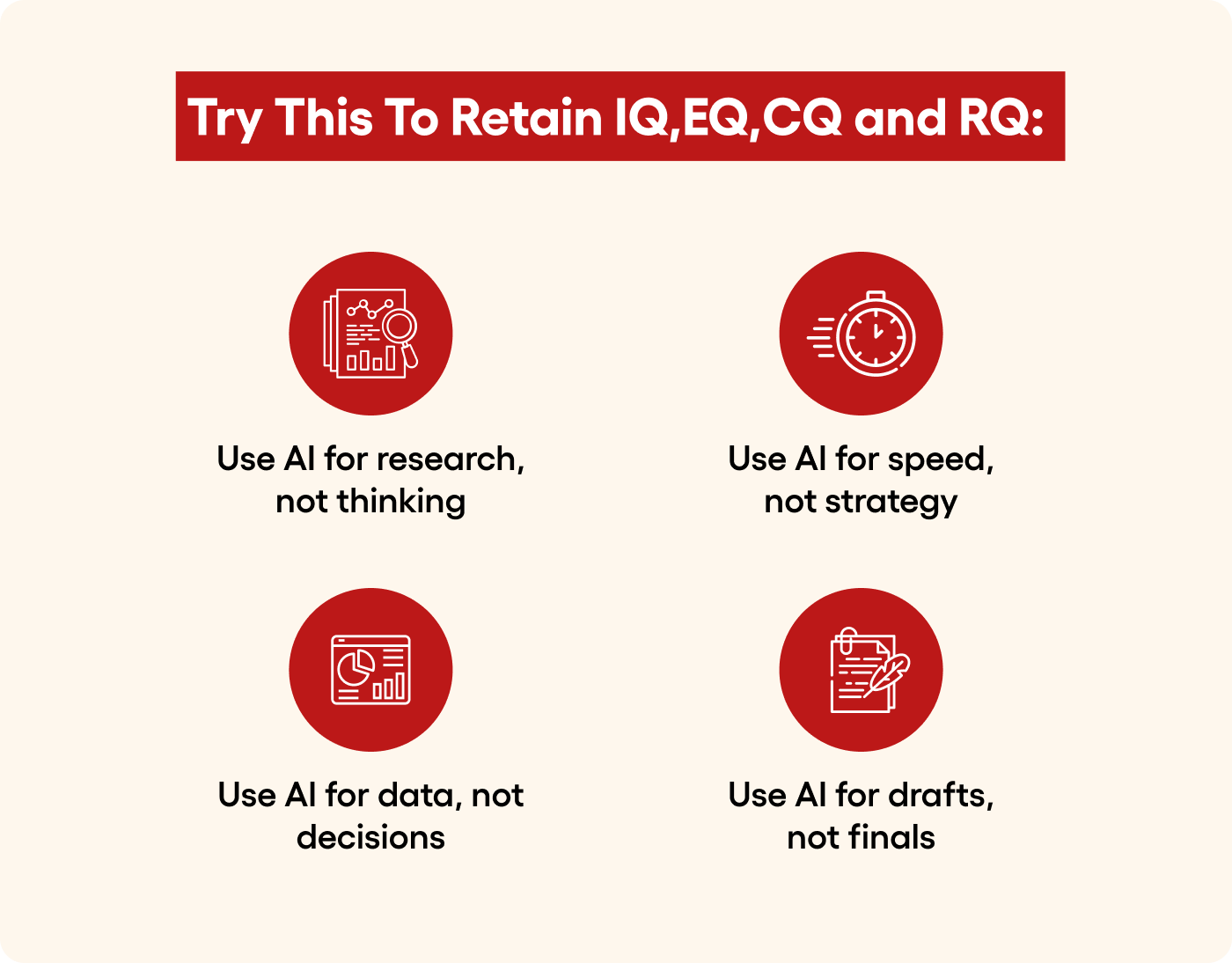
Remember:
Every technology revolution creates winners and losers.
The printing press made scribes obsolete.
The internet killed travel agents.
But AI is different.
It's not replacing jobs. It's potentially replacing thinking.
The winners won't be those who use AI most.
They'll be those who use it strategically while preserving human cognitive capability.
TLDR: Build an AI-enhanced brain or an AI-dependent one?
The future belongs to those who can think with AI, not those who let AI think for them.
Hit reply and tell me: What's one task you've completely outsourced to AI that you probably shouldn't have? I read every response.
Until next week,
Ritesh
PS: No, I'm not against AI. But I am against our intelligence becoming artificial because of AI. AI has come a long way and it’ll continue to get better. But AI is only as good as you are. Your prompts, your context, your limitations. All require you right now. So preserve yourself.
